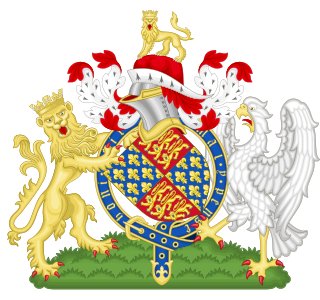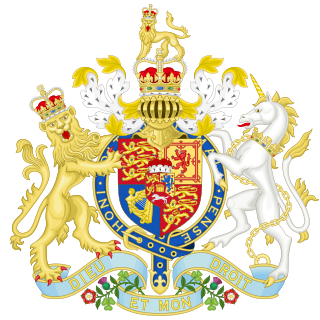Extraterritorial jurisdiction (ETJ) is the legal ability of a government to exercise authority beyond its normal boundaries.

Arson in royal dockyards and armories was a criminal offence in the United Kingdom and the British Empire. It was among the last offences that were punishable by capital punishment in the United Kingdom. The crime was created by the Dockyards etc. Protection Act 1772 passed by the Parliament of Great Britain, which was designed to prevent arson and sabotage against vessels, dockyards, and arsenals of the Royal Navy.

The Treason Act 1351 is an Act of the Parliament of England which codified and curtailed the common law offence of treason. No new offences were created by the statute. It is one of the earliest English statutes still in force, although it has been very significantly amended. It was extended to Ireland in 1495 and to Scotland in 1708. The Act was passed at Westminster in the Hilary term of 1351, in the 25th year of the reign of Edward III and was entitled "A Declaration which Offences shall be adjudged Treason". It was passed to clarify precisely what was treason, as the definition under common law had been expanded rapidly by the courts until its scope was controversially wide. The Act was last used to prosecute William Joyce in 1945 for collaborating with Germany in World War II.

The Offences against the Person Act 1861 is an Act of the Parliament of the United Kingdom of Great Britain and Ireland. It consolidated provisions related to offences against the person from a number of earlier statutes into a single Act. For the most part these provisions were, according to the draftsman of the Act, incorporated with little or no variation in their phraseology. It is one of a group of Acts sometimes referred to as the Criminal Law Consolidation Acts 1861. It was passed with the object of simplifying the law. It is essentially a revised version of an earlier Consolidation Act, the Offences Against the Person Act 1828, incorporating subsequent statutes.

The Act of Uniformity 1548 or the Act of Uniformity 1549 was an Act of the Parliament of England, passed on 21 January 1549.

The Malicious Damage Act 1861 is an Act of the Parliament of the United Kingdom of Great Britain and Ireland. It consolidated provisions related to malicious damage from a number of earlier statutes into a single Act. For the most part these provisions were, according to the draftsman of the Act, incorporated with little or no variation in their phraseology. It is one of a group of Acts sometimes referred to as the Criminal Law Consolidation Acts 1861. It was passed with the object of simplifying the law. It is essentially a revised version of an earlier consolidation Act, the Malicious Injuries to Property Act 1827, incorporating subsequent statutes.

The Piracy Act 1698 was an Act of the Parliament of England passed in the eleventh year of King William III. The main purpose behind the statute was to make some corrections to the Offences at Sea Act 1536.

The Piracy Act 1717, sometimes called the Transportation Act 1717, was an Act of the Parliament of Great Britain that established a regulated, bonded system to transport criminals to colonies in North America for indentured service, as a punishment for those convicted or attainted in Great Britain, excluding Scotland. The Act established a seven-year transportation sentence as a punishment for people convicted of lesser felonies, and a fourteen-year sentence for more serious crimes, in lieu of capital punishment. Completion of the sentence had the effect of a pardon; the punishment for returning before completion was death. An estimated 50,000 convicts were transported to the British American colonies.

The Piracy Act 1837 is an Act of the Parliament of the United Kingdom. It abolished the death penalty for most offences of piracy, but created a new offence often known as piracy with violence, which was punishable with death. This offence still exists in the United Kingdom and in the Republic of Ireland, but is no longer punishable by death in either country.

The Accessories and Abettors Act 1861 is a mainly repealed Act of the Parliament of the United Kingdom of Great Britain and Ireland. It consolidated statutory English criminal law related to accomplices, including many classes of encouragers (inciters). Mainly its offences were, according to the draftsman of the Act, replacement enactments with little or no variation in phraseology. It is one of a group of Acts sometimes referred to as the Criminal Law Consolidation Acts 1861. It was passed with the object of simplifying the law. It collected the relevant parts of Peel's Acts and others.

The Incitement to Mutiny Act 1797 was an Act passed by the Parliament of Great Britain. The Act was passed in the aftermath of the Spithead and Nore mutinies and aimed to prevent the seduction of sailors and soldiers to commit mutiny.

The Territorial Waters Jurisdiction Act 1878 is an Act of the Parliament of the United Kingdom. It is still in force. It codifies the law relating to offences committed in the territorial waters of the United Kingdom, including crimes committed on foreign ships. Under section 7 of the Act, the applicable law is the law of England and Wales, even if the offence is committed off the coast of Scotland or Northern Ireland.

The Punishment of Offences Act 1837 was an Act of the Parliament of the United Kingdom of Great Britain and Ireland. It abolished the death penalty for a number of statutory offences and replaced it with transportation for life.

The Criminal Law Act 1826 is an Act of the Parliament of the United Kingdom. It was a consolidation Act. It consolidated a large number of Acts relating to criminal procedure. It was due to Sir Robert Peel.

The Piracy Act 1850, sometimes called the Pirates Repeal Act 1850, is an Act of the Parliament of the United Kingdom. It relates to proceedings for the condemnation of ships and other things taken from pirates and creates an offence of perjury in such proceedings.

The Criminal Justice Administration Act 1851 is an Act of the Parliament of the United Kingdom.
Offences at Sea Act or Crimes at Sea Act is a stock short title used for legislation in Australia, New Zealand and the United Kingdom relating to the piracy and other offences within the jurisdiction of the admiralty.

The Magistrates' Courts Act 1952 was an Act of the Parliament of the United Kingdom which related to magistrates' courts. It was repealed by section 154 of, and Schedule 9 to, the Magistrates' Courts Act 1980.

The Genocide Act 1969 was an Act of the Parliament of the United Kingdom. It gave effect to the Convention on the Prevention and Punishment of the Crime of Genocide approved by the General Assembly of the United Nations on 9 December 1948.

The Criminal Law Act 1827 was an Act of the Parliament of the United Kingdom, applicable only to England and Wales. It abolished many obsolete procedural devices in English criminal law, particularly the benefit of clergy. It was repealed by the Criminal Law Act 1967.








